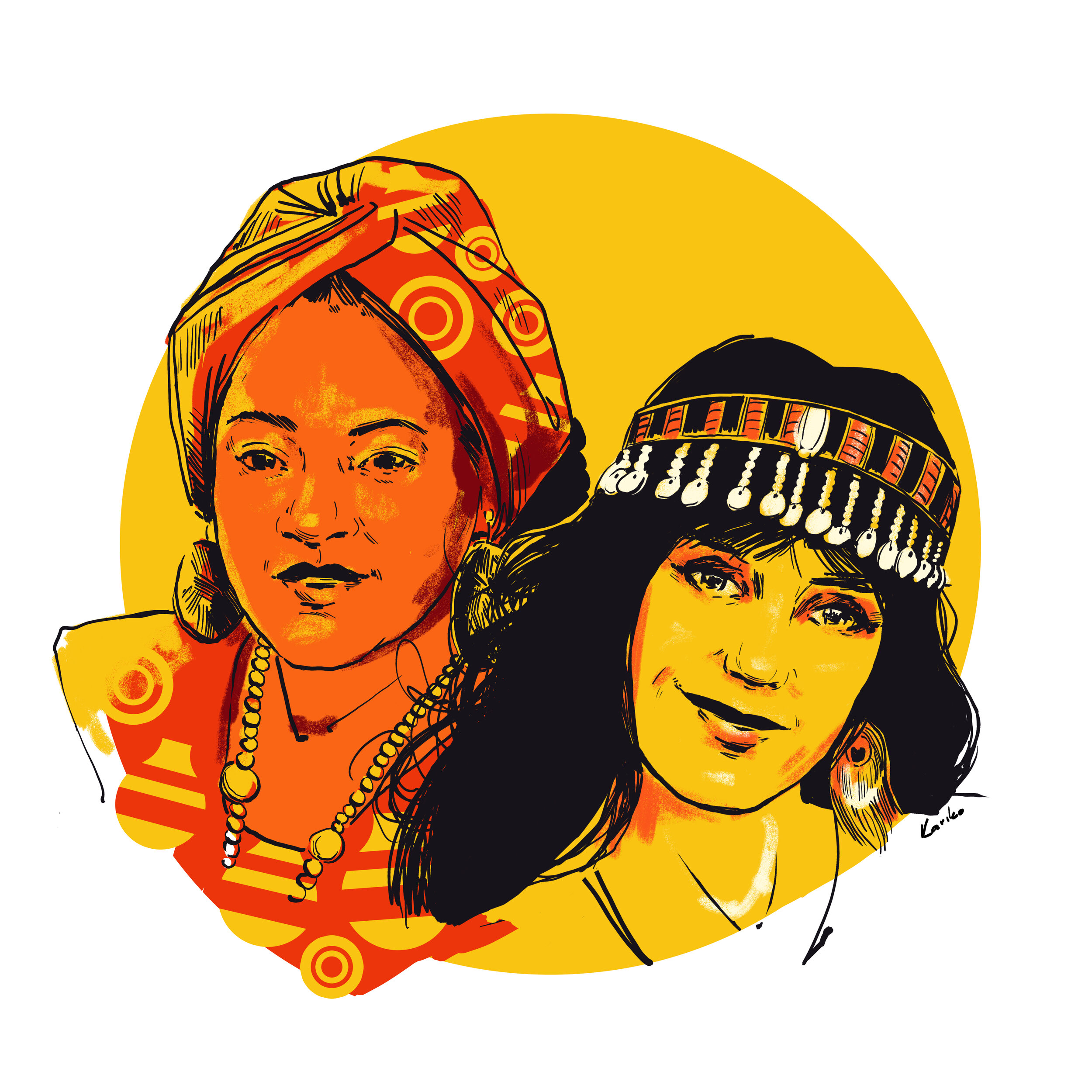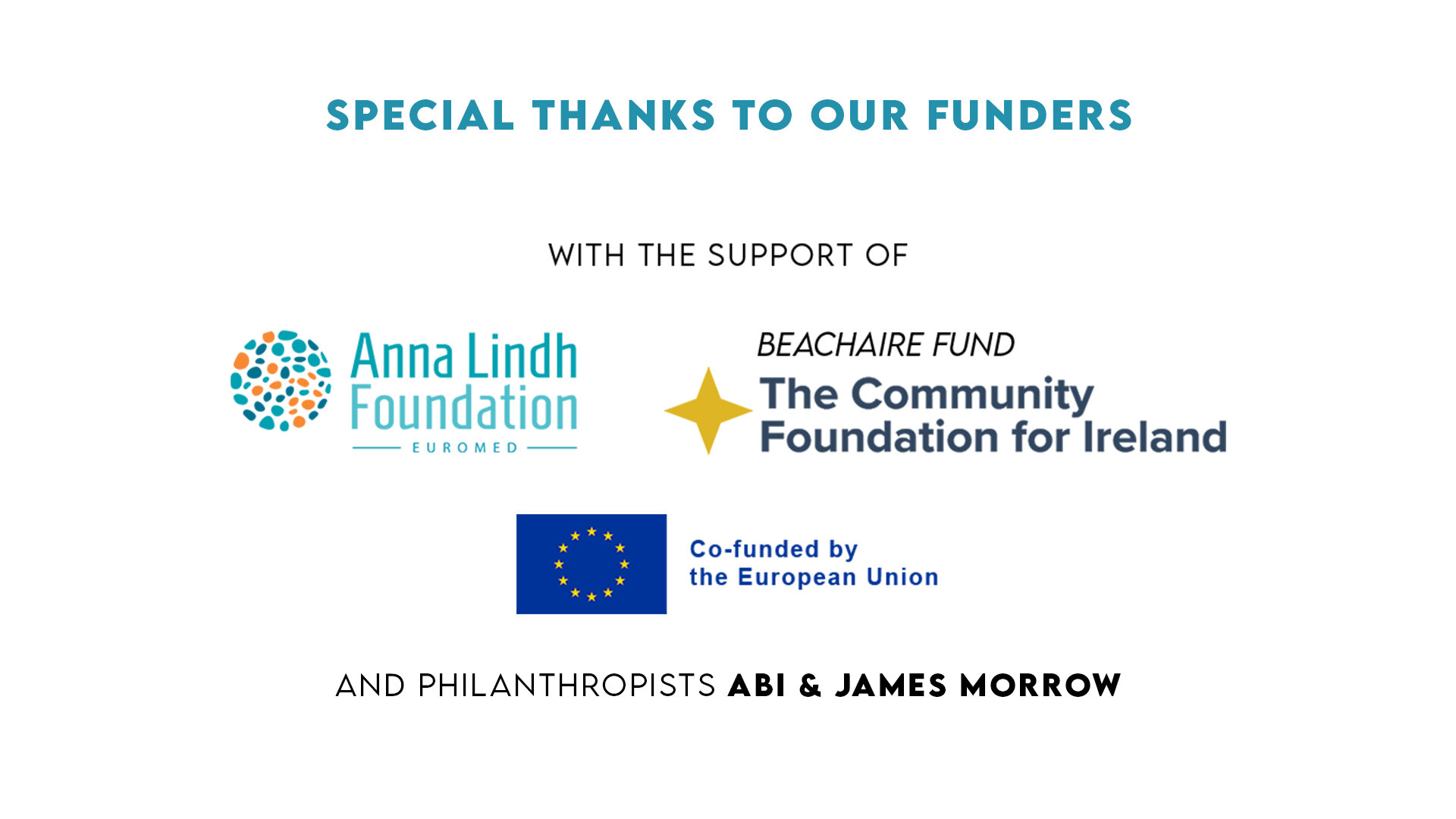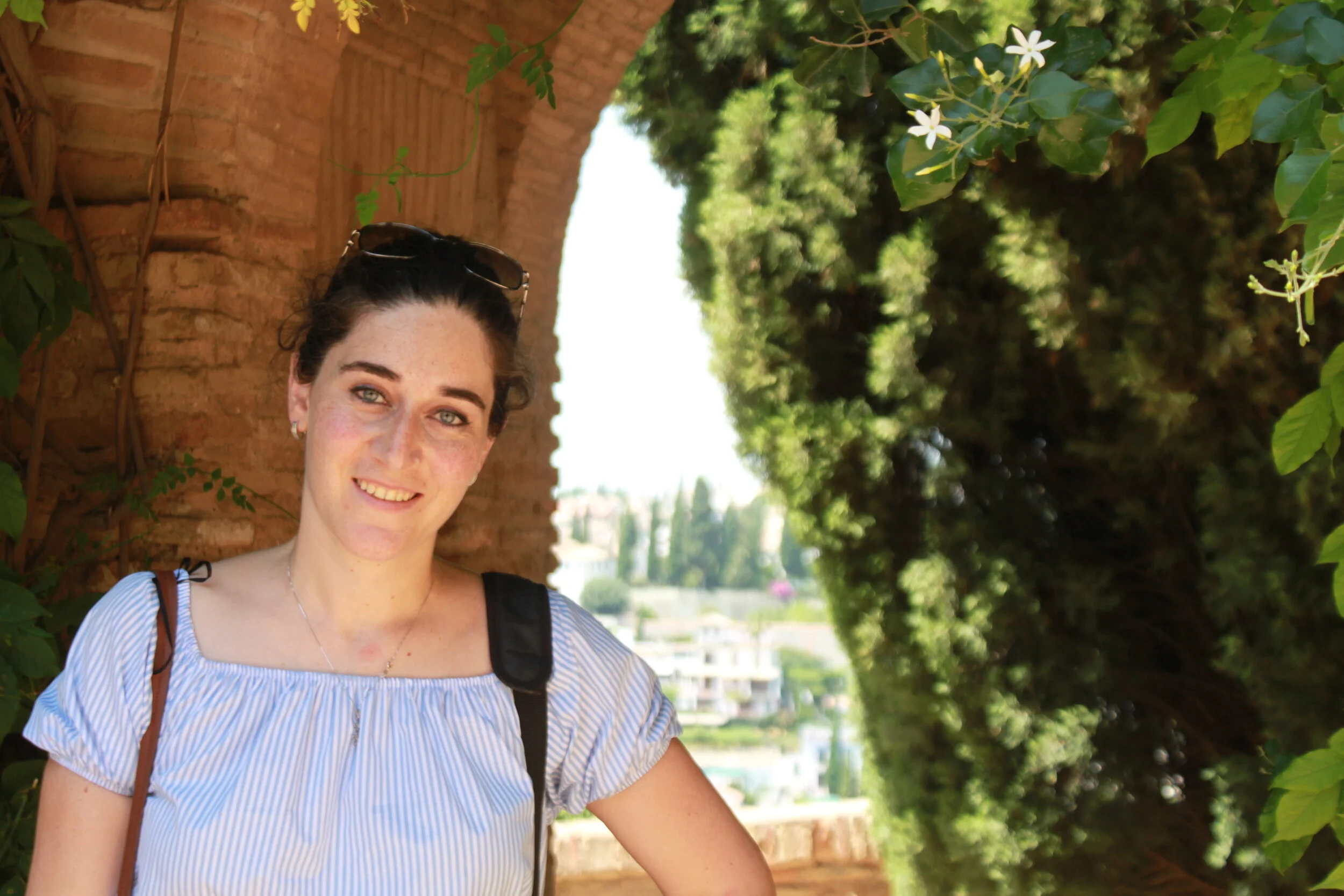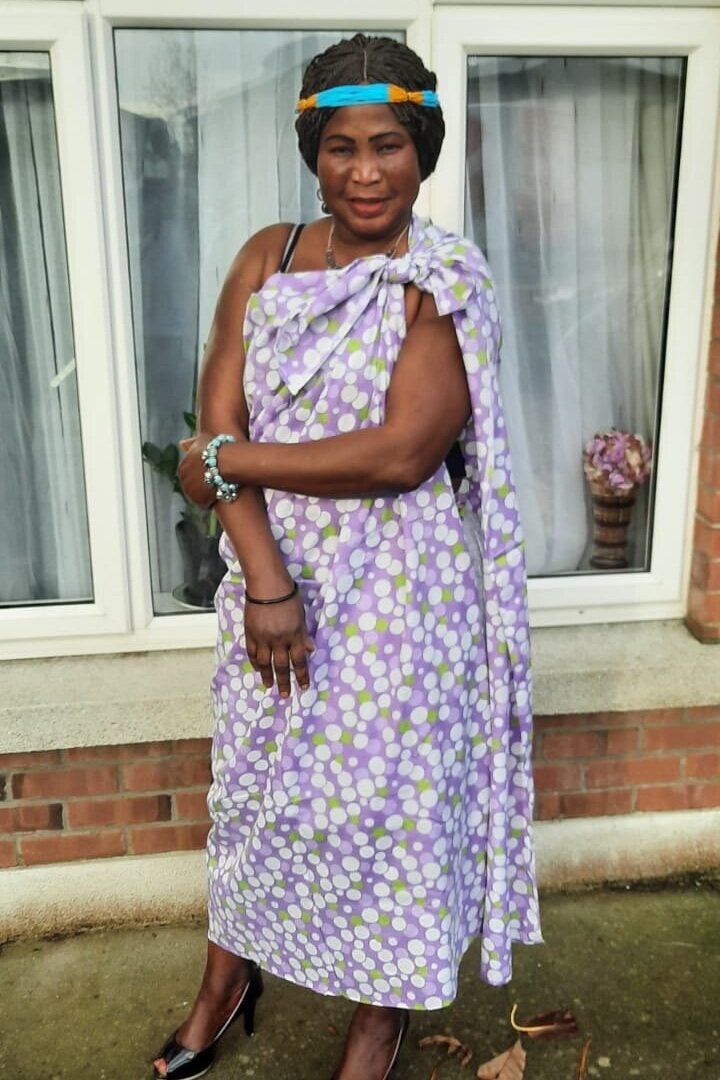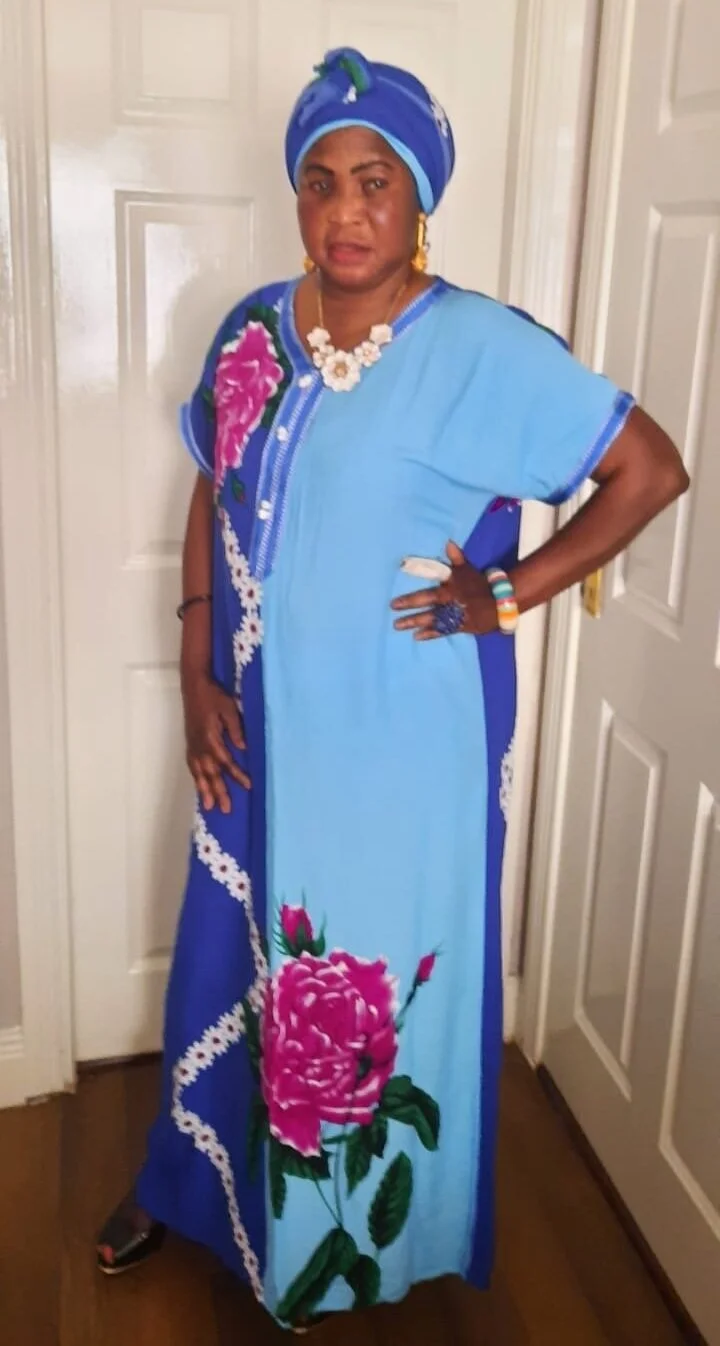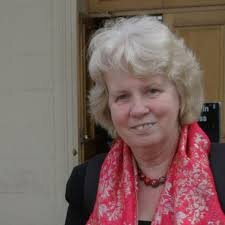Salome & Melanie by Szabolcs Karikó
Parallel Story #1
Salome Mbugua & Melanie Lynch
Kenya & Ireland
This parallel story was put forward by Herstory and AkiDwA for Movement
Salome and Melanie have been shaped and influenced by their experiences of migration, education, peace, and women’s empowerment. Born and raised in Kenya, Salome Mbugua has always held a deep passion for education and peace. It was the opportunity for further study that brought her to Ireland in 1994 where she quickly became involved in youth work and women’s organisations. In 2001, Salome founded AkiDwA - Ireland’s first national migrant women’s organisation which celebrates its 20th anniversary this year. Melanie Lynch, born and raised in Ireland, grew up to stories of familial migration and attended a multicultural school in rural Ireland where difference was celebrated. Like Salome, she migrated for further study and worked in the UK and France before she found herself in Kenya where soul searching lead to a new career direction. Returning to Ireland, she founded Herstory, a women’s empowerment movement that tells the stories of modern, historic, and mythic women.
Salome’s story is first. To skip to Melanie’s click here.
Salome’s Story
TW; violence, rape, exploitation
‘Educate a woman and you educate a nation’ - this popular African proverb was a driving force of my father’s legacy. He made sure all my sisters and I were well educated and additionally, are independent. Growing up, we witnessed him transferring property to my mother and he also put her in charge and control of his coffee plantation, which was unheard of, especially in rural areas. He believed that education has no limit. I hold a Master’s in Equality Studies from UCD and have just finished my Doctorate at Trinity College Dublin in International Peace Studies. This was in line with his vision that education has no age limit.
After my secondary schooling, I worked as a teacher in one of the driest parts of Kenya- Baringo district where we had to walk for over six kilometres to fetch water. I lived with wild animals and snakes but persevered until I started college to do social work, a journey that brought the reality of life, especially during my field placement where I worked with women in the largest slum in Kenya. 70% of the women whom I worked with were head of their households, sole providers for their family. They lived destitute lives in poor conditions. Many girls were involved in prostitution for survival to feed their families. After my studies, I was lucky to get a job with the organisation which had offered me work placement. My advocacy and campaign work for change and challenging inequality began here. We advocated for an end to the exploitation of the girl child. Many girls were missing from school due to poverty and because their parent couldn’t afford to keep them in school. Even though primary education is free in Kenya, these children had turned to street begging and men were taking advantage of them. My role was to get them off the street, put them back into school and work towards re-integrating them with their parents. While this job was quite rewarding in terms of actions taken, it was exhausting and quite often I was intimidated by the men. I remember one time we took a case where two men had held five girls captive for weeks, sexually exploiting them, and when the day of the hearing arrived, the men used bribery and were let go without being sentenced. These girls never received justice and their lives were destroyed. It was heart breaking to have 7-, 8- and 12-year-old girls being diagnosed with HIV after contracting it on the street. We buried two of them during my three years as a social worker. I too suffered in the slums to the extent that I personally experienced police brutality and ended up in hospital. Working in Nairobi was dangerous and risky but the issues affecting women and girls were real.
After three years working as a social worker, I got the opportunity to study in Ireland. As devoted Catholics growing up, our house was used as a place of worship since we didn’t have a church. An Irish priest from Mayo had been our priest for many years and had become a friend of the family. It’s this same priest who helped me to secure a scholarship to study in Ireland. When I arrived in 1994, many people mistook me to be a nun. I had a long braid and I used to wear a long chain with a cross. My assumption before I left Kenya was that everyone in Ireland was Catholic, and I wanted to belong. I quickly became connected to women’s groups and youth programmes in Ireland, including St Michael’s Family Resource Centre, Inchicore where I had student placement, and a Foroige club in Cork.
Salome. Credit: The Irish Times
I returned to Kenya in 1995 and in 1996 I moved to Uganda and joined my fiancée from Ireland whom I had met during the course of my study. Here, I worked as a gender equality officer. Life for women in Uganda was completely different. I met with impoverished rural women in the Rakai district of Kyotera County; many women, especially grandmothers, were taking care of large numbers of their grandchildren after these kids lost their parent to HIV/AIDs. I worked with women to establish a community-based organisation, Women Enterprises Association of Rakai (WEAR), which was formed to address the social and economic effects of HIV/AIDS and poverty in rural Uganda. This way women were able to access small loans and establish a better way of selling their agricultural products. The growth of WEAR from 13 to 327 members and 22 regional groups proved to be a successful model which I later used in Ireland in the establishment AkiDwA (1) - the migrant women’s network Ireland.
In 1998, after returning to live permanently in Ireland, I couldn’t find a job that matched my qualification, so I took up care work of the elderly in Dalkey. I enjoyed doing this work, it reminded me of my early days – when I was 7, I had been awarded to my grandmother to help with taking care of my grandfather who had become paralysed and couldn’t do anything for himself. I found a job which was closer to my social work skills in the same year, working with young indigenous boys with challenging behaviour in a home in the north inner city of Dublin. One boy nicknamed me ‘my African mother’ and during my visit to Kenya in 1999 he requested that I bring him back an elephant. It was during this period that I met a nun who introduced me to the Sisters of Mercy, who helped support the establishment of AkiDwA. I was very excited to see many women (Africans) in the streets of Dublin that I could identify with, quite often I stopped them to have conversations. After I was introduced to Sr Joan McManus of the Catherine McAuley Centre in 2001, AkiDwA came to be.
Credit: NWCI
Now, AkiDwA has over 2500 individual members from 42 countries of origin and 36 organisation affiliates and is a representative body for migrant women, irrespective of their national/ethnic background, legal status, religion etc. The organisation has become a leading advocate and authoritative voice for migrant women living in Ireland and has been influencing policy on different areas of migrant life, specifically on the establishment of the Female Genital Mutilation Act 2012 and policy on health, gender-based violence and access to services. In 2003, after families were presenting to AkiDwA with fears of deportation, I brought legal and community groups together to form the CADIC (a coalition to advocate for the rights of Irish children and their families), and in January 2005 the Irish Born Child Scheme was introduced by the Department of Justice. After campaigning for months, 17,000 parents and their children were given the right to reside in Ireland. In 2009 I undertook research on the impact of Direct Provision on women asylum seekers in Ireland. A report was produced and launched in 2010, I am Only Saying it Now, Experiences of Women Seeking Asylum in Ireland. I’ve used this report to lobby for change with policy makers and service providers over the years and the report was referenced in the McMahon report on Direction Provision in 2018. We’ve also worked with the Department of Foreign Affairs in the development, monitoring and review of Ireland’s first National Action Plan on Women, Peace and Security, the United Nations Resolution 1325 and in the development of the second National Action Plan, launched in 2015. In 2018, I was appointed by the Tánaiste to chair the working group developing the third National Action Plan on Women, Peace and Security. In 2007 I spoke alongside Mary Robinson, former President of Ireland, in an international conference. I have presented at the Dail several times as well as at the European parliament.
This year (2020) I contested for Senate, a strange and tough route that I wanted to try. I believe that if you’re not at the table where the matters are being discussed you’ll be the agenda as an item for discussion. Meaningful change happens when one is at the top of the change they want to see. I had previously been elected the Vice-Chairperson of the National Women Council of Ireland in 2010 and I served in that capacity for four years. My appointment as a Commissioner for Irish human rights in 2018 saw me lead a delegation to Geneva to appear at the UN committee on elimination of all forms of racial discrimination.
My mission work in Africa remains the most ambitious to be accomplished. I’m always looking to give hope and work to those who’re living in the margins of society. My concern has always been women who aren’t able to escape violence and gender-based violence. In 2010 I co-founded Wezesha - an initiative of African Diaspora for international development. In Kenya I’ve been working with women in the slums of Nairobi developing strategies on combatting repeated cycles of poverty and together with a group of 26 women from Majengo slums, the women, through savings, have been able to buy land in a rural part of Kenya where they hope they can move to in the future. Through mobilisation, fundraising efforts and the support of Irish people, we’ve been able to purchase land where the women aim to establish a multipurpose centre to provide different types of services from training and counselling to peace-building. The work continues.
[1] Akina Dada Wa Africa, Swahili for sisterhood.
Melanie’s Story
My life has been a journey migrating through physical and psychological borders. I crave the liminal - the space between worlds - beyond polarities where reality and the great truths exist. I choose to be an outsider. From this viewpoint multiple perspectives can be accessed simultaneously and humanity can be experienced in its glorious diversity. Life becomes an adventure, an open book, and I’m all the richer for it.
Like every person on this planet, migration is in my blood. As a 10 year old I would voyage by bicycle across Dublin with my father to buy Jewish bread from Bretzel Bakery on Lennox Street. Our Jewish ancestors immigrated to Ireland from France and this weekly ritual kept their memory and tradition alive. On my mother’s side, our great-grandparents were Northern Irish Catholics who had no choice but to move to the Republic to escape discrimination and find work. Some ancestors migrated across the division of religion to marry Protestants. The heart knows no boundaries. If only we listened to it more.
At a family reunion in Fermanagh we retraced our humble ancestral lineage through seven generations who endured the famine and the Troubles. A few ancestors emigrated to America and sent money home, transforming the trajectory and fortune of future generations. Two centuries later, their bravery and generosity has impacted on my access to education and career opportunities. I’m baffled by the attitude that immigrants are expected to be highly skilled with university education. How quick the Irish are to forget our history of emigration and the opportunities our ancestors received abroad that Ireland couldn’t offer at the time.
As a teenager I got a glimpse of the potential for a thriving multicultural Ireland. At Wilson’s Hospital School, students descended from six continents (with the exception of Antarctica and the Arctic!) to this progressive school perched on a hilltop in the middle of rural Ireland. Every week the postbox filled with letters and parcels from 29 countries around the world. From China to Mexico, we were all outsiders, even the Irish. As a Catholic I was an outsider in a Protestant school and the Protestants are a minority in the south. Being an outsider was a bizarrely liberating experience. There was no pressure to fit in to a constructed ‘normal’ because it didn’t exist. In this melting pot environment the question: “Where are you from?” was never racist. Our curiosity and respect for other faiths and cultures was genuine. We thrived in this Church of Ireland ethos. Difference was celebrated. There was unity in our diversity.
After a year dabbling in maths and philosophy at Trinity College Dublin I migrated to art college in the UK. There I was taken under the wing of African students who regaled our common histories and shared kindred spirits with the Irish. This was big kudos as they hosted the best parties and told extraordinary stories of adventures on the world’s most diverse continent. The outsiders became the insiders.
A theory tutor sparked my interest with his infectious passion for African-American music and its influence on the civil rights movement. During Obama’s historic presidential campaign I penned my degree thesis on deconstructing colonial ideologies and racial stereotyping. It was an insomnia-inducing process, delving into the dark recesses of the Imperial British psyche as it invented toxic propaganda and crude stereotypes to justify colonisation, slavery and world domination. I was so disturbed by what I uncovered that I honestly thought I would fail my thesis, so it was some shock when my paper was awarded the highest grade in the faculty. The experience still haunts me to this day. If the origins of racism were taught in school there would be no racism. Twelve years later, our new Movement project is the creative realisation of this research and we have developed an education programme to foster diversity and inclusion in schools.
After graduation I emigrated to London and then Paris where I lived the Mad Men dream creating advertising campaigns for NGOs and global brands. I was trained to explore universal insights and our shared humanity. Diverse cultures have been converging in these great cities for centuries and the mélange of influences is inspirational catnip for the creative soul.
Sveva Gallmann with a local tribeswoman
In 2014 I found myself in Kenya, where some soul searching sparked a new career direction that would enable me to apply my creativity and communications skills for the good of humanity. After a safari holiday with college friends I volunteered at the Gallmann Mukutan Conservancy on the edge of the Great Rift Valley. I have never felt so alive waking up to lions and black mambas in the garden. Serendipitously I got the opportunity to work on the 4 Generations Project, a founding inspiration for Herstory and an ingenious education programme developed to preserve tribal cultures.
Kuki Gallmann with local tribes at the Gallmann Mukutan Conservancy
I’ll never forget the day when the chef pointed to my white skin and questioned: “ Muzungu (white person in Swahili) which colony are you from?” To his surprise I responded; “I’m Irish, my tribe is Celtic and my ancestors survived 800 years of British colonial rule.” That day the locals gave me the Swahili nickname ‘Black-maned Lioness’ and adopted me as one of their own.
The conservancy was surrounded by neighbouring communities of Samburu, Pokot, Kalenji and Kikuyu people. I envied the tribes people for their rootedness to the earth. They are not slaves to the greed of capitalism or the narcissism pandemic of selfie culture. Instead they live by the fundamentals of what it means to be human: family, community, nature, creativity, storytelling and spirituality. In their eyes I saw great depth and presence. Spending time in their company made me question the definition of civilization. How utterly wrong the colonisers were to paint these people as inferior and primitive. In the West there’s much talk about saving Africa. My question is “How can Africa save the West?”
Melanie lighting up the GPO in honour of Irish Somali activist Ifrah Ahmed for the 2020 Herstory Light Festival by Dodeca
I have been an immigrant and an emigrant. Herstory wouldn’t exist without these formative and expansive experiences. Since the beginning migration has been a core theme. In the early days Bard Mythologies introduced me to Cessair, the first mythological woman in Ireland who was an immigrant, as recorded in The Book of Invasions. Sandy Dunlop, co-founder of Bard Mythologies explains that ‘Cessair’s epic voyage across the known world from Sudan to Ireland makes Homer’s Odyssey look tame.’ In modern history, the heroines of the RTÉ Herstory TV series and Blazing A Trail exhibition had to emigrate to realise their potential. Many were Irish refugees, forced to emigrate and escape poverty in Ireland.
The Herstory and AkiDwA teams
On Herstory’s first birthday in 2017 I visited AkiDwA to celebrate the launch of Africa Rising and hear the stories of migrant women who have joined our communities from distant shores. This was my first encounter with the phenomenal Salome Mbugua, Founder of AkiDwA, researcher, gender equality activist and human rights advocate. A Kenyan with a huge heart, Salome is one of my greatest heroines. She’s so busy getting on with her job that she never gets the credit or spotlight she deserves. This year Herstory will collaborate with AkiDwA to celebrate the 20th anniversary of Ireland’s first migrant women’s organization.
Migration is one of the few constants of the human experience. We are a migratory species. Homo sapiens have been travelling across the world long before the invention of the wheel. National Geographic maps reveal the extensive migration routes of our prehistoric ancestors. Diversity is not a modern buzzword. This is an ancient truth. The pandemic is a reminder that borders and nationalities are fabrications that conceal our common humanity.
Ireland has one of the greatest Diasporas in the world with 70 million people cherishing their Irish roots worldwide. However, the Irish migration story is marked by successes and struggles. We know only too well what it feels like to be excluded, stereotyped and discriminated against. As Mary McAleese once said; “We are a vibrant first world country but we have a humbling third world memory.”
In these divisive times it’s easy to forget that immigration and emigration are two sides of the same story. It’s only right that we open our doors and our hearts to the New Irish and give them the opportunities our ancestors received around the world. If Ireland has the greatest diaspora we should be the most compassionate, inclusive country in the world.
DISCOVER MORE ABOUT THE MOVEMENT PROJECT
Early human migration map by the National Geographic
The content of this publication is the sole responsibility of Herstory and does not necessarily reflect the position of the Anna Lindh Foundation or the European Union. www.annalindhfoundation.org

